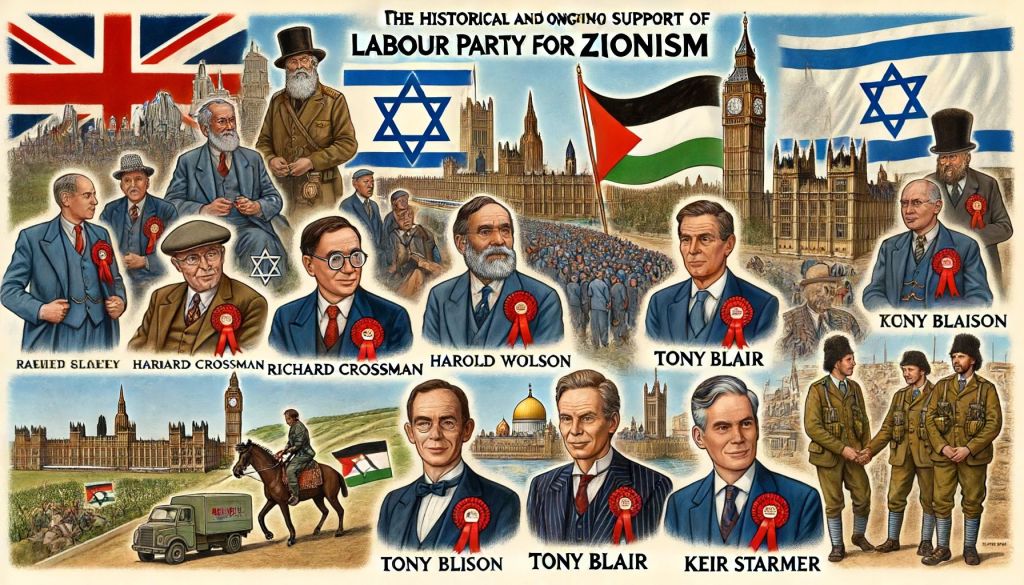
Throughout the turbulent history of the Israeli-Palestinian conflict, the Labour Party in the UK has exhibited a complex and evolving stance on Zionism. Despite the significant humanitarian crisis that unfolded during the Nakba—the violent expulsion of over 800,000 Palestinians from their homes in 1948—support for Zionism remained steadfast within significant factions of the party, particularly on the Labour Left.
Labour Left and the Tribune: Consistent Support for Zionism
The Labour Left, characterized by its progressive and socialist ideals, notably continued to back the Zionist cause even during the Nakba. This support was prominently championed by the Tribune newspaper, a key voice for left-wing views within the Labour Party. The Tribune’s unwavering support for Zionism during such a controversial and tragic period reflects the deep ideological divide within the party on this issue.
Prominent Labour Left figures, such as Richard Crossman MP, were vocal advocates for the Zionist movement. Crossman, a leading intellectual and politician, interpreted the displacement of Palestinians in a manner that starkly contrasted with the harsh realities on the ground. In a statement to the House of Commons, he downplayed the suffering of displaced Palestinians by dismissively describing their homes as “only mud huts…terribly bad villages full of vermin.” Such rhetoric underscored a narrative that framed the Palestinian exodus not as a forced expulsion but as a voluntary departure from substandard living conditions. This perspective was indicative of a broader sentiment within sections of the Labour Left that rationalized the displacement in terms less critical of Zionist actions.
Post-Nakba: Labour’s Return to Enthusiastic Zionist Support
With the establishment of the State of Israel in 1948, the broader Labour Party leadership swiftly reverted to a robust endorsement of Zionism. This marked a continuity of support that spanned several decades, from the mid-20th century through to the present day.
Harold Wilson, who served as Prime Minister from 1964 to 1970 and again from 1974 to 1976, was a fervent supporter of Israel. Under his leadership, Labour’s foreign policy strongly aligned with Israeli interests, reinforcing the UK’s diplomatic and military ties with the nascent state.
This pro-Israel stance was further cemented under Tony Blair’s leadership in the late 1990s and early 2000s. Blair, known for his centrist “New Labour” approach, maintained a close relationship with Israeli leaders and was vocal in his support for Israel’s right to self-defense. His administration was often criticized for its perceived bias towards Israel, especially during periods of heightened Israeli-Palestinian conflict.
Most recently, under the leadership of Keir Starmer, the Labour Party has continued its tradition of supporting Israel. Starmer, who has sought to distance the party from allegations of antisemitism and to restore Labour’s image as a strong advocate for Jewish communities, has frequently condemned Palestinian resistance and reiterated Labour’s commitment to Israel’s security. His leadership reflects an ongoing commitment to a pro-Israel stance within the party’s mainstream, despite the contentious nature of this issue among its broader membership and voter base.
The Labour Party’s historical and ongoing support for Zionism, despite the humanitarian consequences for Palestinians during the Nakba and subsequent conflicts, highlights a deep-rooted ideological alignment that transcends the party’s internal factions and leadership changes. From the Labour Left’s steadfast backing through the Tribune and figures like Richard Crossman, to the enthusiastic endorsements from leaders like Harold Wilson, Tony Blair, and Keir Starmer, Labour’s Zionist commitment remains a significant and sometimes divisive aspect of its foreign policy. This enduring stance underscores the complexities and challenges in addressing the multifaceted realities of the Israeli-Palestinian conflict within the context of UK politics.

